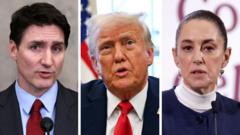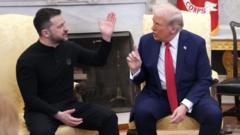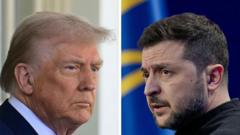**As Trump delays his controversial tariffs, both Canada and Mexico find political strengths in the agreement.**
**Diplomacy Wins: A Temporary Halt on Trump's Tariff Threats**

**Diplomacy Wins: A Temporary Halt on Trump's Tariff Threats**
**Negotiations among North American leaders yield a momentary truce amid economic concerns.**
In a significant diplomatic development, President Donald Trump has opted to suspend the anticipated tariffs on Mexico and Canada for 30 days, following intensive negotiations with both nations. This decision comes as a reprieve, allowing leaders from both neighbors to celebrate political victories. While Trump claims success in securing commitments on border security and narcotics control, Canadian Prime Minister Justin Trudeau and Mexican President Claudia Sheinbaum also emerge with key achievements.
The impending trade conflict—threatening to shake the North American economy to its core—has been postponed, giving all sides room to navigate their political landscapes. Trump's strategy, reminiscent of previous fiscal battles, seems to have gained traction in negotiations, pressuring Canada and Mexico to enhance measures against drug trafficking.
Historically, Trump's aggressive tariff tactics have led to significant backlash from international partners, especially during the last administration where tariffs on aluminum and steel provoked escalated tensions. Though new tariffs on Chinese goods remain poised for enforcement, the fate of North America’s trade relationship hangs in balance with the current 30-day extension.
Canadian officials expressed relief, perceiving the halt as a much-needed truce in weighing domestic political implications—especially with Trudeau’s dwindling time in office. Canadian policymakers had been scrambling to comprehend and fulfill Trump’s demands while ramping up border management, including new surveillance tech worth C$1.3 billion.
In Mexico, President Sheinbaum advocated for a calm approach and calmly negotiated the pause in tariffs with Trump. She managed to secure not only the suspension but also commitments from the US to address gun trafficking—an ongoing issue affecting Mexican security. This maneuver buys her administration crucial time to solidify agreements, as speculation mounts over potential visits by US officials to further these discussions.
As world markets watch closely, the next few weeks could define the trajectory of US-Canada-Mexico relations and set precedents for future negotiations. Both Trudeau and Sheinbaum now have an opportunity to reinforce their leadership amid international pressures, while Trump’s intentions remain shrouded in uncertainty. As the political landscape evolves, stakeholders across the region hope for enduring stability in trade relations ahead.
The impending trade conflict—threatening to shake the North American economy to its core—has been postponed, giving all sides room to navigate their political landscapes. Trump's strategy, reminiscent of previous fiscal battles, seems to have gained traction in negotiations, pressuring Canada and Mexico to enhance measures against drug trafficking.
Historically, Trump's aggressive tariff tactics have led to significant backlash from international partners, especially during the last administration where tariffs on aluminum and steel provoked escalated tensions. Though new tariffs on Chinese goods remain poised for enforcement, the fate of North America’s trade relationship hangs in balance with the current 30-day extension.
Canadian officials expressed relief, perceiving the halt as a much-needed truce in weighing domestic political implications—especially with Trudeau’s dwindling time in office. Canadian policymakers had been scrambling to comprehend and fulfill Trump’s demands while ramping up border management, including new surveillance tech worth C$1.3 billion.
In Mexico, President Sheinbaum advocated for a calm approach and calmly negotiated the pause in tariffs with Trump. She managed to secure not only the suspension but also commitments from the US to address gun trafficking—an ongoing issue affecting Mexican security. This maneuver buys her administration crucial time to solidify agreements, as speculation mounts over potential visits by US officials to further these discussions.
As world markets watch closely, the next few weeks could define the trajectory of US-Canada-Mexico relations and set precedents for future negotiations. Both Trudeau and Sheinbaum now have an opportunity to reinforce their leadership amid international pressures, while Trump’s intentions remain shrouded in uncertainty. As the political landscape evolves, stakeholders across the region hope for enduring stability in trade relations ahead.






















